Emeritus Professor Raghbendra Jha, 1953–2023

Paul J. Burke and Hal Hill, The Australian National University
Emeritus Professor Raghbendra (“Raghav”) Jha, who unexpectedly passed away on 20 November 2023, was a leading scholar on the Indian economy and in several fields of economics. He published no fewer than 32 books (both authored and edited) on various aspects of the Indian economy, society, and public policy; on South Asia; and in economics more generally. His interests were exceptionally diverse, including macroeconomics, public economics, agriculture, poverty and living standards, political economy, and much else. Raghav’s work was primarily motivated by the major development challenges and issues of the day. His work was analytically grounded and informed by the global development literature, with careful attention to data and a keen eye on the historical context.
Raghav attracted many graduate students who wanted to learn from and work with him, many of whom subsequently became personal friends and co-authors. During his 20 years at the Australian National University (ANU) alone he was primary supervisor for 15 PhD graduates, and on the panels of others too. He was primary supervisor for another 11 PhD graduates in earlier roles. His broad global network of leading academics and officials is illustrated by the exceptional quality of speakers who accepted his invitation to present the Narayanan Oration on key aspects of contemporary India.
Born in Chaibasa, Raghav attended school in Patna, where his father held a senior administrative position. Tragedy hit the family early when his father passed away in his forties, when Raghav was only four years old. Raghav was brought up by his mother and other family members and rode a bicycle to school. India’s founding president, Dr Rajendra Prasad, lived in the district. Raghav admired him greatly and could vividly recall at least two occasions when he was invited to Dr Prasad’s home for a chat.
Raghav excelled academically. He gained entry to the prestigious St Stephen’s College at the University of Delhi and subsequently to the famous Delhi School of Economics. His stellar performance led in turn to a PhD scholarship at Columbia University, where he studied under Professor Edmund Phelps, a demanding but appreciative supervisor who was subsequently awarded the Nobel Memorial Prize in Economic Sciences. Aged just 25 years at graduation, Raghav then embarked on his academic career.
For over two decades he enjoyed a peripatetic academic life, holding positions at institutions including the Delhi School of Economics, the Indira Gandhi Institute for Development Research (Mumbai), Williams College, Queens University, and the University of Warwick. He then took up the Rajiv Gandhi Chair of South Asian Economics at ANU in 2001, and ANU would become his academic home for the rest of his life. At ANU he was the long-serving Executive Director of the Australia South Asia Research Centre (ASARC) as well as serving as Head of the Arndt-Corden Department of Economics (ACDE) for several years.
A sample of his book titles illustrates the diversity of his intellectual output and interests. His books include Macroeconomics for Developing Countries, Modern Public Economics, Facets of India’s Economy and Her Society (Volumes I and II), Handbook on Food: Demand, Supply, Sustainability and Security, The Economics of Food Security (the latter two co-edited with his close friend Dr Raghav Gaiha), his 2023 volume Macroeconomics for Development: Prognosis and Prospects, and the edited collection Twenty K.R. Narayanan Orations: Essays by Eminent Persons on the Rapidly Transforming Indian Economy. He published prolifically in journals on topics including poverty alleviation, social protection, debt sustainability, inflation, and much more. His article ‘Trevor Swan and Indian Planning: The Lessons of 1958/59’ with Selwyn Cornish won the 2019 Peter Groenewegen Prize for the best article in the History of Economics Review over the previous two years.
Although Raghav lived outside India for considerable periods, the country was central to his life and work. He was highly spiritual, and as Dr Raghav Gaiha observed, “committed to secularism and equity”. He was a strong supporter of Prime Minister Narendra Modi (a photo of the two of them adorned his office) and his reform agenda, while expressing some concern about the repression of minorities. He considered Australia to be his second home and loved Canberra.
Raghav was a private but friendly and highly courteous person with a warm laugh. He was a most congenial and accessible colleague, with an office door that was often open. He was a voracious reader and invariably up for a friendly and lively discussion about something topical, from a recent academic paper to a story in the day’s New York Times, and much else. As befits his rich and busy life, he and his wife and son had just returned to Delhi, and he had been looking forward to a seminar on three decades of economic reform in India, when the end came.
Upon his transition to Emeritus status in June 2021, Raghav wrote to his former PhD students to wish them well in their professional and personal lives and share some thoughts and reflections. These included the imperative to “not discount the future too much” and the importance of analysis and listening to different viewpoints. He remarked that while continuing his various research projects he also “hoped to rest a bit” and “spend some time travelling and in my home country, India”. Sadly, his retirement was all too short.
Raghav has left an enduring legacy through his extensive publications and the many students whom he taught and mentored. He will be deeply missed by his world-wide network of graduates, collaborators, and friends.
We are grateful to family, friends, and colleagues of Raghav for helpful discussions and information. Particular thanks go to Dr Raghav Gaiha.